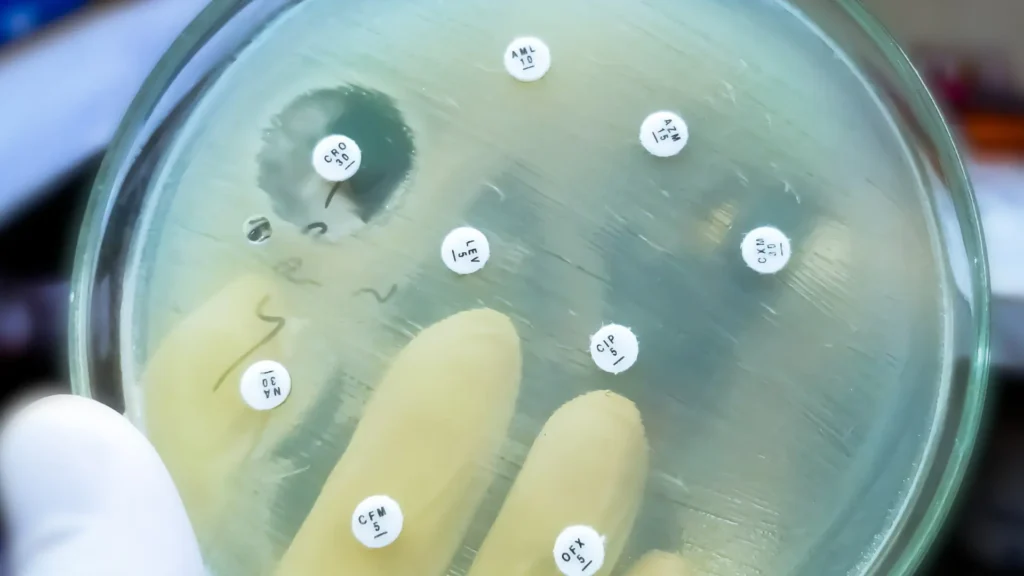
Antimicrobial Resistance (AMR) is a growing global crisis that occurs when bacteria, viruses, fungi, and parasites become resistant to antimicrobial agents, rendering treatments ineffective and increasing the risk of severe illness, disease spread, and death.
Hunter New England Health and HMRI researcher, Infectious Diseases and Antimicrobial Stewardship Pharmacist, Kristi Kozierowski, is currently researching Antimicrobial Resistance. Here she shares her knowledge about this escalating problem.
Where did it come from?
Antimicrobial resistance (AMR) is not a new phenomenon. The story of AMR starts with the discovery of penicillin by Alexander Fleming in 1928. During Fleming’s initial work, he noted that some bacteria could resist the effects of penicillin, the first commercially produced and widely used antibiotic. In his Nobel Prize acceptance speech, Fleming warned about the potential for bacteria to become resistant to antibiotics if they were used indiscriminately.
He famously said, “The time may come when penicillin can be bought by anyone in the shops. Then there is the danger that the ignorant man may easily underdose himself and by exposing his microbes to non-lethal quantities of the drug, make them resistant.”
This early warning about the dangers of resistance, wasn’t widely heeded at the time and in due course belief became reality. In 1940, just two years after penicillin was widely introduced into medical use, scientists observed the first cases of penicillin resistance in staphylococci, a commonly encountered microorganism.
How does it happen?
AMR occurs naturally as microorganisms evolve in response to environmental pressures, including the use of antimicrobial agents (such as antibiotics, antifungals, and antivirals). However, human behaviour – especially the misuse and overuse of these drugs – has accelerated the process and made AMR a significant public health issue.
AMR is a natural process that occurs over time via genetic changes in microorganisms. These genetic mutations or acquisition of resistance genes allows microorganisms to become resistant to the drugs that would normally kill or control them.
Unfortunately, the emergence and spread of antimicrobial resistant organisms is accelerated by human activity, mainly the misuse and overuse of antimicrobial agents (such as antibiotics, antifungals, and antivirals) to treat, prevent or control infections in humans, animals and plants.

What risks does this present?
Antimicrobial medicines are the cornerstone of modern medicine. The emergence and spread of antimicrobial resistant microorganisms threaten our ability to treat common infections and makes other treatments and procedures riskier. Many modern medical procedures, such as routine surgical procedures (hip replacements, caesarean sections), cancer treatments (chemotherapy), organ transplants, and childbirth rely on the effectiveness of antibiotics and other antimicrobials to prevent infections. Without effective antimicrobials, the risks associated with these procedures increase significantly.
Antimicrobial Resistance is a multifaceted threat that can impact people from all walks of life and poses global threats to human health, veterinary, agriculture and environmental industries.
Antimicrobial Resistance affects many groups of people and systems, including individuals with established infections, vulnerable populations (such as the elderly, children, and immunocompromised individuals), healthcare systems, economies, and even agriculture.
Its risks are far-reaching and potentially catastrophic, making it a pressing public health issue that requires coordinated global action.
Without concerted efforts to reduce overuse of antimicrobials, improve infection prevention, and develop new treatments, the risks posed by AMR will only increase, leading to a future where common infections become deadly once again.
What can you do about it?
Use Antibiotics Responsibly:
Practice good hygiene and infection control
Vaccinate
Educate and Advocate
Should we avoid antibiotics or only use them as a last resort?
The key to tackling antimicrobial resistance (AMR) is not about avoiding use of antimicrobial medicines altogether but rather using them wisely and responsibly. Antimicrobial agents are essential for treating infections and saving lives, but their overuse and misuse can contribute to the growing problem of antimicrobial resistance (AMR). Therefore, the goal is not to eliminate their use, but to use them in a targeted and controlled way to ensure they remain effective in the long term.
To stay ahead of microbial evolution:
• Use antibiotics only when necessary, and ensure the correct antibiotic is used for the infection.
• Promote research into new treatments and vaccines.
• Practice prevention through vaccination, good hygiene, and proper infection control.
• Support global efforts to reduce overuse in agriculture and healthcare settings.
Ultimately, the challenge is to ensure that we use antibiotics in a way that allows them to remain effective for as long as possible, while also investing in research and alternative treatments to stay ahead of resistance. It’s all about balance, not avoidance.
Want to stay up-to-date with the latest medical research and evidence-based health and wellbeing news from our research community at HMRI?